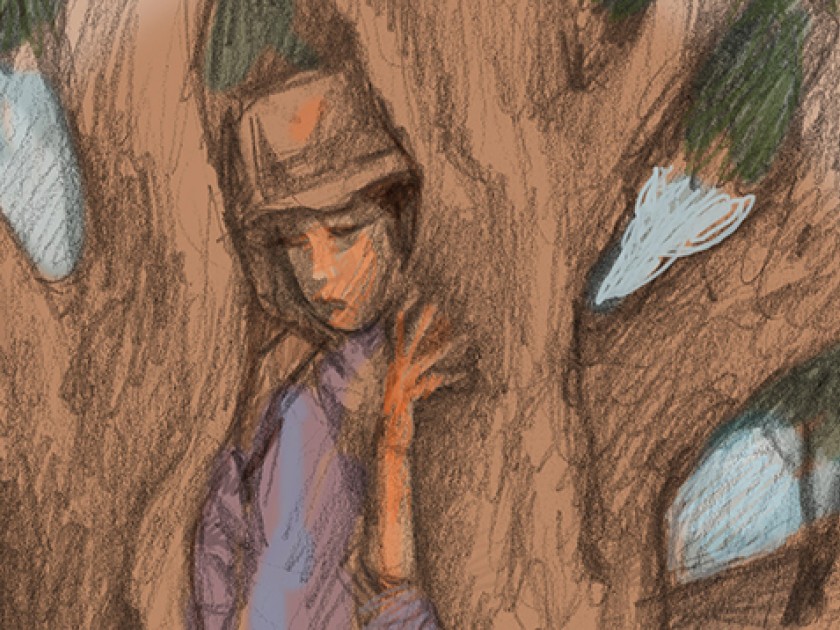
Haim Watzman’s new book, Necessary Stories, is a selection of 24 stories from his monthly column in The Jerusalem Report from the past nine years. Haim is guest blogging for the Jewish Book Council all week as part of the Visiting Scribe series here on The ProsenPeople.
For the last nine years I’ve written a short story every four weeks. I haven’t yet missed a deadline yet.
Nine years ago, in 2008, I began writing a column for a biweekly news magazine, The Jerusalem Report. My column, “Necessary Stories,” has appeared in every other issue since then.
The editors invited me to write for the magazine in the wake of two non-fiction books I’d written, a memoir about my service as an IDF infantry reservist over nearly a decade and a half and a John McPhee-type travel narrative about a trip through the rift valley that runs up Israel’s eastern frontier. They thought they’d get personal essays, but after writing two first-person fact-based books, I wanted to let my imagination run free. It was more fun and required less research. I started sending in short stories.
Having to come up with a work of short fiction with convincing characters, a compelling storyline, and engaging prose once a month like clockwork might sound daunting. I have to produce a story whether inspired or not, whether in the mood or not, whether my day job as a translator leaves me time or not. Many is the time — it happened just a couple weeks ago — that I have sat myself down at my computer on the appointed day without a clue as to what my story will be about.
But the discipline is good for me. Perhaps because I worked for many years as a journalist, I seem to produce my best work when a deadline looms. I certainly would not have written upwards of 115 short stories in the last decade had I simply waited for ideas and inspiration to come (and, to be honest, without the incentive of the modest fee that the magazine pays me for each piece).
Is each one a great work of literature? No, of course not. Sometimes a story doesn’t click for me, or for readers. But I’m surprised at how seldom that happens. Last year, when I had to reread my output to choose which stories to include in the Necessary Stories book that I’ve just published, I was gratified to find that the choice was difficult. A large portion of the stories I reread had, at least for me, stood up to time and rereading. No less gratifying were the e‑mails from the loyal readership I’ve built up over the years, readers who encounter the stories in the magazine or on my website, where they also appear. Readers remembered and urged me to include stories they had read years ago, and there were so many such requests I had no choice but to disappoint some of them.
Sometimes a story’s plot, characters, or situation are suggested by current events — the new collection includes, for example, “Sin Offering,” which addresses Israel’s treatment of African refugees. Or it might be a historical event: “The Devil and Theodor Herzl” imagines Herzl’s meeting with Vyacheslav von Plehve, Minister of the Interior for the Russian Czar and fomenter of the infamous Kishinev pogrom. Some, like “Bananas,” are based on family tales — in this case the experience of my wife’s family, immigrants from Baghdad who lived during Israel’s early years in an immigrant camp in Holon. Still others grow out of personal pain: “In Exile at Home,” “A Him to him” and “Fireflies” are stories of mourning for my younger son, a soldier in the Golani Brigade who died in a diving accident six years ago.
But sometimes really good stories come out of nowhere. When I sat down to write the story that became “The Dryad,” the illustration for which (by Avi Katz; our collaboration will be the subject of another post in this series) graces the cover of the new book and accompanies this post, I hadn’t a clue what I was going to write. When I’m stumped, I find that the best method is to take a few minutes to look deep into my soul to find out what is bothering it most. Often I find two or three disparate things that don’t, at first, seem to have anything to do with each other. In the case of “The Dryad,” it was the intense ankle pain I was suffering from after a long hike with friends a few days before, and the anguish I had heard in a story told to me by a schoolteacher friend. Neither my hike nor the friend’s specific story appears in “The Dryad.” Instead, they provide the scenery and the mood. Once I had that in mind, and sat down to write, the central character and narrative followed, and developed in ways I had not expected or planned.
That’s what makes meeting my deadline so much fun
Haim Watzman lives in Jerusalem and is the author of three books: Company C: An American’s Life as a Citizen-Soldier in Israel; A Crack in the Earth: A Journey Up Israel’s Rift Valley; and a story collection, Necessary Stories, a selection of the more than 150 he has written. His play The Chair won the 2021 Theater Institute Award of the Contemporary Jewish Drama International Competition sponsored by the Estera Rachel and Ida Makinskie Jewish Theater in Warsaw. He has translated more than 50 books from Hebrew into English, among them works by Shlomo Avineri, David Grossman, Hillel Cohen, Amos Oz, and Tom Segev. He edited the English-language version of Yuval Noah Harari’s worldwide bestseller, Sapiens. Subscribe to his Substack newsletter here.